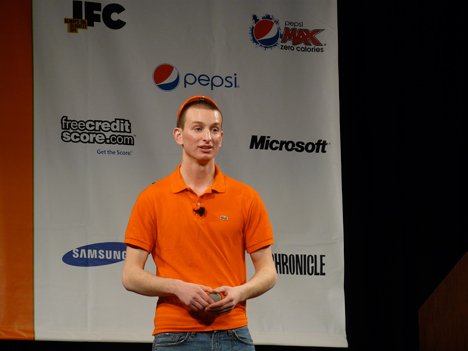
When he was in high school, Seth Priebatsch set up an underground snack bar in his high school.
He would make a trip to Costco, buy mass amounts of bulk food, and hide them in lockers around school, giving each locker a combination lock. He emailed the combination to 15 people, telling them to take what they wanted and leave cash behind. It became a sort of scavenger hunt for the lockers.
He expected those 15 to forward the email around school, which they did.
Pretty soon he was pulling in $1,500 per day.
That was only a few years ago. A few companies (one called Giftopia) and a few semesters at Princeton later (he dropped out), Priebatsch is the founder of SCVNGR, a location-based game for mobile phones.
Now 22, Priebatsch gave the keynote at SXSWi, but not about SCVNGR or any other company he’s Chief Ninja, as he calls himself. He talked about games taking over the next decade.
Preisbatsch took the stage with a bright orange Polo shirt and matching sunglasses on his head, which apparently is a trademark.
He was refreshingly unguarded, exuberant, and optimistic. He was like the anti-Zuckerberg.
His speech was about solving the world’s problems with gaming. Not World of Warcrafts either, but social gaming. Applying what he called a game layer on top of every problem.
Like, for one, the problem of school. As a dropout, he saw school as a broken system. Moreso though he saw it as a game, and one which produces losers.
The motivations to do well in school were good grades. Take away those motivations, ie graduate, and that system collapses. What inspires anyone to continue in learning, say, mathematics, if there is no grade attached.
And failing in school is constant possibility. It shouldn’t be, because failing in life is not.
So, here’s his solution: re-impliment grades as a progression dynamic. Like a video game. Get to this level, you get to go to the next. Learn this, you can get to the next level. There is no failing, just trying again and again to move up. Like life.
It’s all about individual motivations, which are the basis of games. Pretty great, outside-the-box thinking, I think.
Many of today’s popular websites were based on this, he argued, like Groupon.
Groupon was a big game. The motivation is a free lunch, the challenge is getting friends to sign up so the deal becomes “on” in a short amount of time. Wildly successful.
This can be applied to any number of problems, he continued.
He chose global warming as his next problem. All the marquees of a game were there: dwindling time to solve a problem and good-as-ever motivation.
To demonstrate, he gave all the audience members a random assortment of coloured cards. He wanted us to trade the cards with people sitting around us to get each row to have the same colours. We had a minute or so. The motivation was that his company would donate $100,000 to charity.

It worked.
These examples are only thought experiments – and fairly simplistic ones at that – but Preisbatsch had me captivated with them. From what I see, he’s leading the charge away from social networking into these sorts of social challenges – ones that better the world in more tangible ways.
His ideas could be called brash, at times naive, but he conveyed them is such an inclusive, convincing way. I went in a skeptic and came out a believer. No wonder this guy’s been starting companies since he was a teenager, and got a $15 million investment from Google earlier this year.
Engaging, thoughtful and likable, Preisbatsch is a name we’ll need to learn to pronounce very soon. I’m rooting for him.












